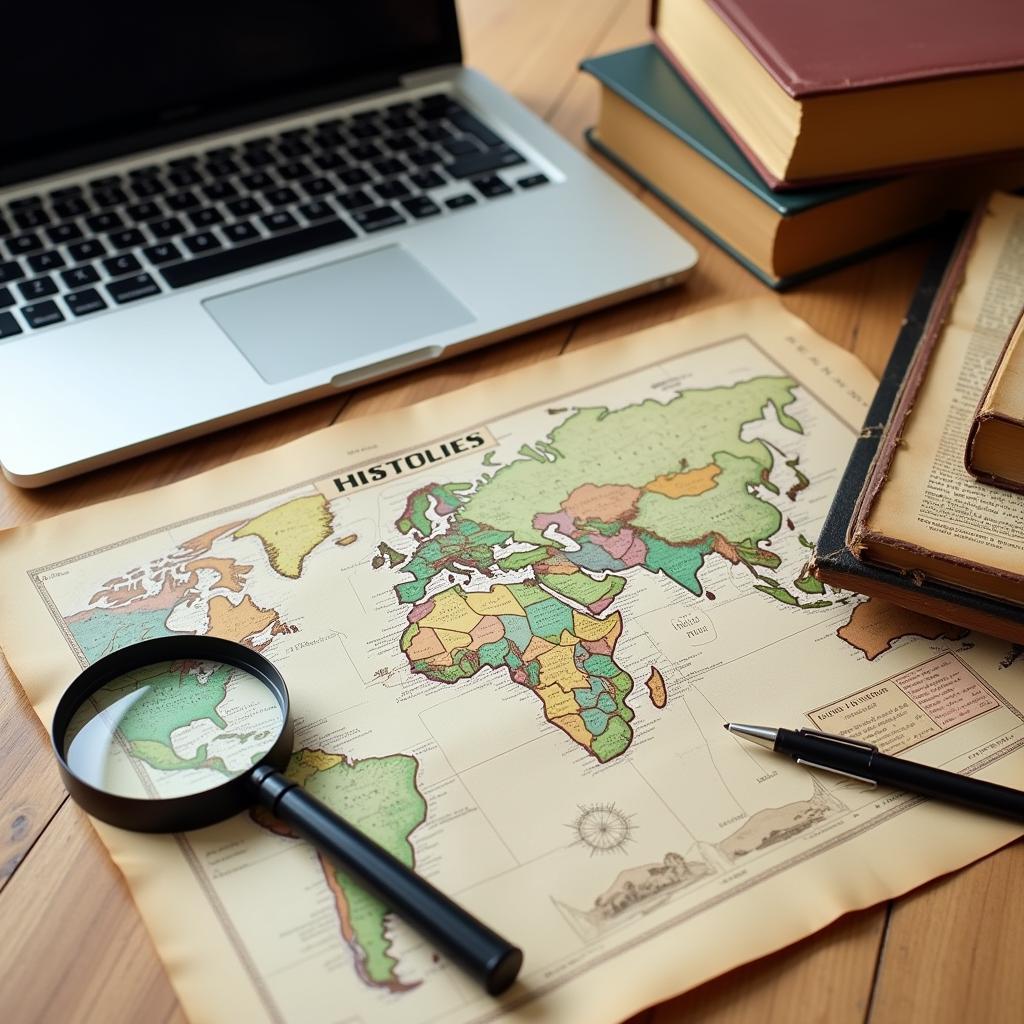Researching History is like embarking on a thrilling detective case. You delve into the echoes of bygone eras, piecing together fragments of evidence to uncover the hidden truths and captivating stories of our ancestors. Whether you’re exploring your family tree or a pivotal historical event, the journey of researching history can be both enlightening and deeply rewarding.
Unraveling the Mysteries of the Past: Why Research History?
Why are we so drawn to the past? Researching history is more than just a dry academic pursuit; it’s about connecting with the human experience across time. It’s about understanding the forces that have shaped our world, the stories of individuals who came before us, and ultimately, our place in the grand narrative of humanity.
Essential Tools for Effective Historical Research
 Tools for Researching History
Tools for Researching History
Like any good detective, a history researcher needs the right tools for the job. Thankfully, we live in an age where a wealth of resources are available at our fingertips. Here are some indispensable tools for effective historical research:
- Online Archives and Databases: Websites like Ancestry.com, Fold3, and JSTOR provide access to millions of digitized historical documents, records, and academic journals.
- Libraries and Historical Societies: These institutions house vast collections of books, manuscripts, photographs, and other primary sources.
- Oral Histories: Don’t underestimate the power of a good story. Interviewing individuals who lived through or have firsthand knowledge of historical events can provide invaluable insights.
- Museums and Historic Sites: Immersing yourself in the physical spaces where history happened can be incredibly powerful.
Navigating the Labyrinth: Primary vs. Secondary Sources
One crucial distinction to understand in historical research is the difference between primary and secondary sources:
- Primary Sources: These are firsthand accounts or artifacts created during the time period being studied. Examples include diaries, letters, government documents, photographs, and artifacts.
- Secondary Sources: These are interpretations and analyses of primary sources. Examples include textbooks, biographies, and historical articles.
Utilizing a combination of both primary and secondary sources is essential for creating a well-rounded understanding of historical events.
The Art of Critical Analysis: Evaluating Historical Information
Not all historical information is created equal. As you delve deeper into your research, it’s crucial to develop the skill of critical analysis. Ask yourself these questions when evaluating sources:
- Who created this source and why?
- What biases might the creator have had?
- Is there evidence to support the claims made in this source?
- How does this source compare to other sources on the same topic?
By approaching historical sources with a critical eye, you can sift through biases and inaccuracies to uncover a more complete and nuanced understanding of the past.
Researching Countries: A Gateway to Global Understanding
Do you have a particular country or region that fascinates you? Researching countries can be a captivating way to learn about different cultures, historical events, and global connections. From the ancient civilizations of Egypt to the rise and fall of empires, each country has a unique story waiting to be uncovered.
If you’re interested in learning more about researching specific countries, check out our guide on researching countries.
Conclusion: Embracing the Journey of Historical Discovery
Researching history is a journey of discovery, filled with both challenges and rewards. By embracing the right tools, utilizing a variety of sources, and approaching the past with a critical and inquisitive mind, you can unlock the secrets of bygone eras and gain a deeper understanding of the world we live in today.
Frequently Asked Questions About Researching History
1. What is the best way to start researching my family history?
Start by gathering as much information as you can from living relatives. Online genealogy databases like Ancestry.com and FamilySearch can help you build your family tree and uncover valuable records.
2. How can I find primary sources for my research topic?
Online archives, libraries, and historical societies are excellent resources for finding primary sources.
3. What are some common mistakes to avoid when researching history?
Avoid relying on a single source, taking information at face value, and not considering the historical context.
4. How can I make sure my historical research is accurate?
Cross-reference your sources, be aware of potential biases, and look for evidence to support all claims.
5. What are some good resources for researching local history?
Local historical societies, libraries, museums, and even old newspapers can be treasure troves of information.
Need help uncovering the mysteries of the past? Contact us at:
Phone Number: 0904826292
Email: research@gmail.com
Address: No. 31, Alley 142/7, P. Phú Viên, Bồ Đề, Long Biên, Hà Nội, Việt Nam
Our dedicated team is available 24/7 to assist you.